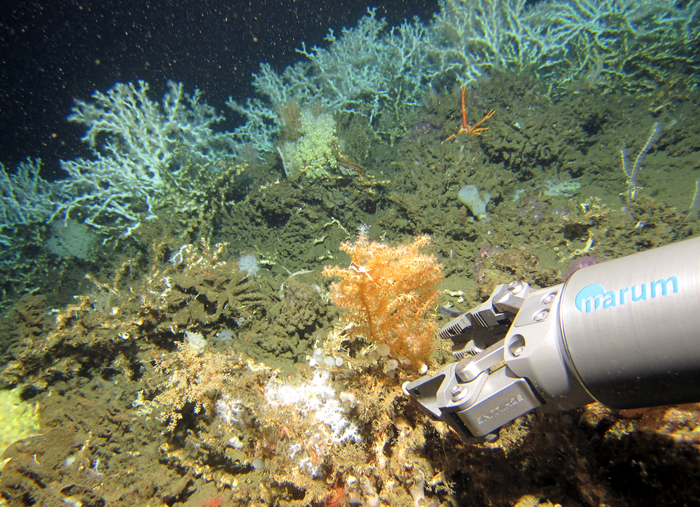A recent study analyzed the effect of future global warming on cold-water corals. Considerations of ancient evidence from the last major global warming event determine food and oxygen supply as primary environmental factors that impact the vitality of cold-water corals in the Mediterranean Sea and the North Atlantic Ocean.

Sampling of cold-water corals in the deep Atlantic Ocean by the MARUM ROV Squid, Bremen, Germany. Image Credit: Dierk Hebbeln and Claudia Wienberg (CC-BY 4.0)
Rodrigo da Costa Portilho-Ramos of the University of Bremen, Germany, and collaborators present such findings in the open-access journal PLOS Biology on May 19th, 2022.
Similar to the tropical corals in shallower waters, cold-water corals act as critical “engineers” of deep-sea reefs and mounds that are habitats to rich and special ecosystems.
As there is progress in climate change, scientists anticipate that cold-water corals are subjected to threats from such factors as reduced food supply, lower oxygen levels, increasing ocean temperatures, and ocean acidification.
But no extinctions of cold-water coral ecosystems have been registered in real-time, so the accurate factors that might identify their fate have been uncertain.
To gain better insights, Portilho-Ramos and collaborators turned to ancient evidence of past climate change as caught in seafloor sediments.
The researchers examined sediments that were gathered at or near six sites of cold-water coral ecosystems in the North Atlantic Ocean and the Mediterranean Sea, employing standard methods to rebuild ocean conditions and the plenty of the common coral species Lophelia pertusa over the past 2000 decades. This period comprises the last significant global warming event on the Earth.
The analysis disclosed that ancient L. pertusa abundance was strongly impacted by the changes in the food supply, which have been delivered either vertically from shallower depths or by lateral water flow along the seafloor.
Furthermore, low oxygen concentration appeared to be the main stressor for L. pertusa. At the same time, variations in ocean temperature and salinity did not show up to be considerably linked with the proliferation or disappearance of L. pertusa with respect to time.
These outcomes indicate that climate change-driven alterations to ocean processes that impact food and oxygen supplies might play key roles in the future health of cold-water coral ecosystems. In certain instances, the data indicate the high abundance of food might redress for low oxygen levels.
The authors of the study feel that more research is needed to additionally explore the role of food supplies and to take ocean acidification into account. This could not be captured in this study.
Marine sediment records from the North Atlantic and the Mediterranean Sea reveal that events of growth and mortality of cold-water corals induced by climatic changes over the last 20,000 years were mainly triggered by food supply controlled by export production and turbulent hydrodynamics rather than by changes in the bottom-water temperature.
Rodrigo da Costa Portilho-Ramos, Center for Marine Environmental Sciences, University of Bremen
Portilho-Ramos added, “Therefore, climate-driven changes in oceanic processes concerning food supply are also likely to be the determining factors of life and death of cold-water coral species in the coming decades.”
Journal Reference:
Portilho-Ramos, R. C., et al. (2022) Major environmental drivers determining life and death of cold-water corals through time. PLOS Biology. doi.org/10.1371/journal.pbio.3001628.